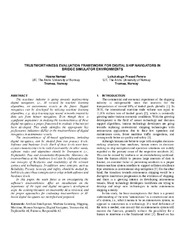Trustworthiness Evaluation Framework for Digital Ship Navigators in Bridge Simulator Environments
Sammendrag
The trustworthiness of AI-based applications, including digital navigators, can be studied from two primary levels: Software and hardware levels. Each of these levels must have certain characteristics to be called trustworthy. In other words, software codes and algorithms should be Transparent, i.e., Explainable, Fair, and Accountable/Responsible. Moreover, the trustworthiness at the hardware level can be elaborated under two concepts of Resilience and Availability of the relevant systems and technologies. In addition, some concepts, such as Reliability, Privacy, Security, and Safety, should be studied for both levels since those concepts can overlap in both software and hardware levels.
In this paper, the main focus is on investigating the software's trustworthiness. After an introduction on the importance of the topic and digital navigator's development steps, the existing literature on trustworthy AI is reviewed, and the proper approaches for evaluating trustworthiness in AIbased digital navigators are identified and proposed.


 English
English norsk
norsk